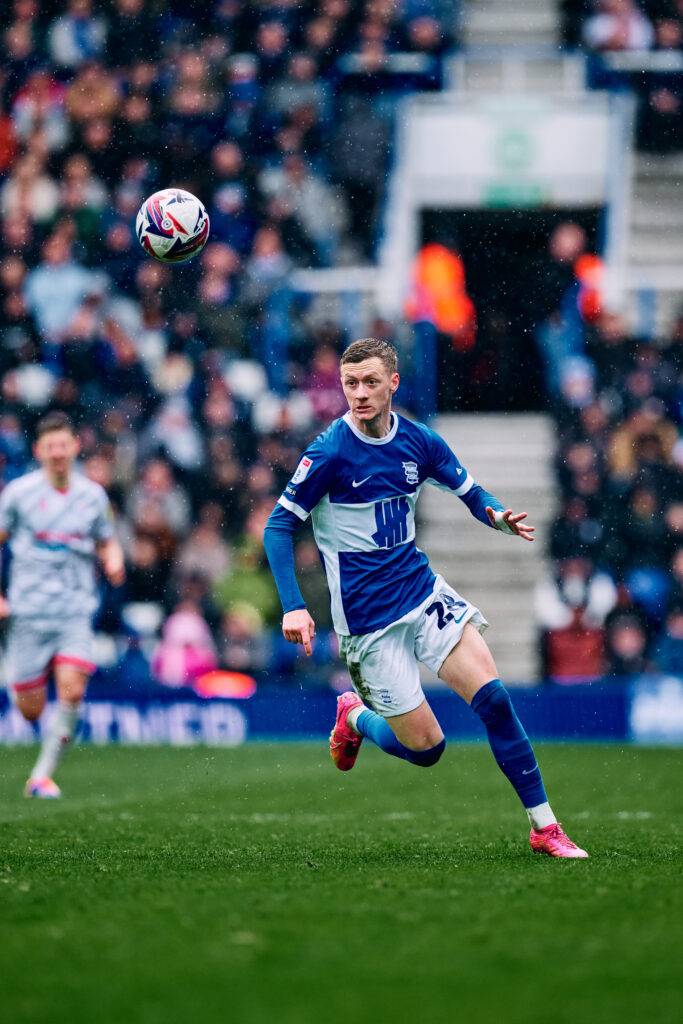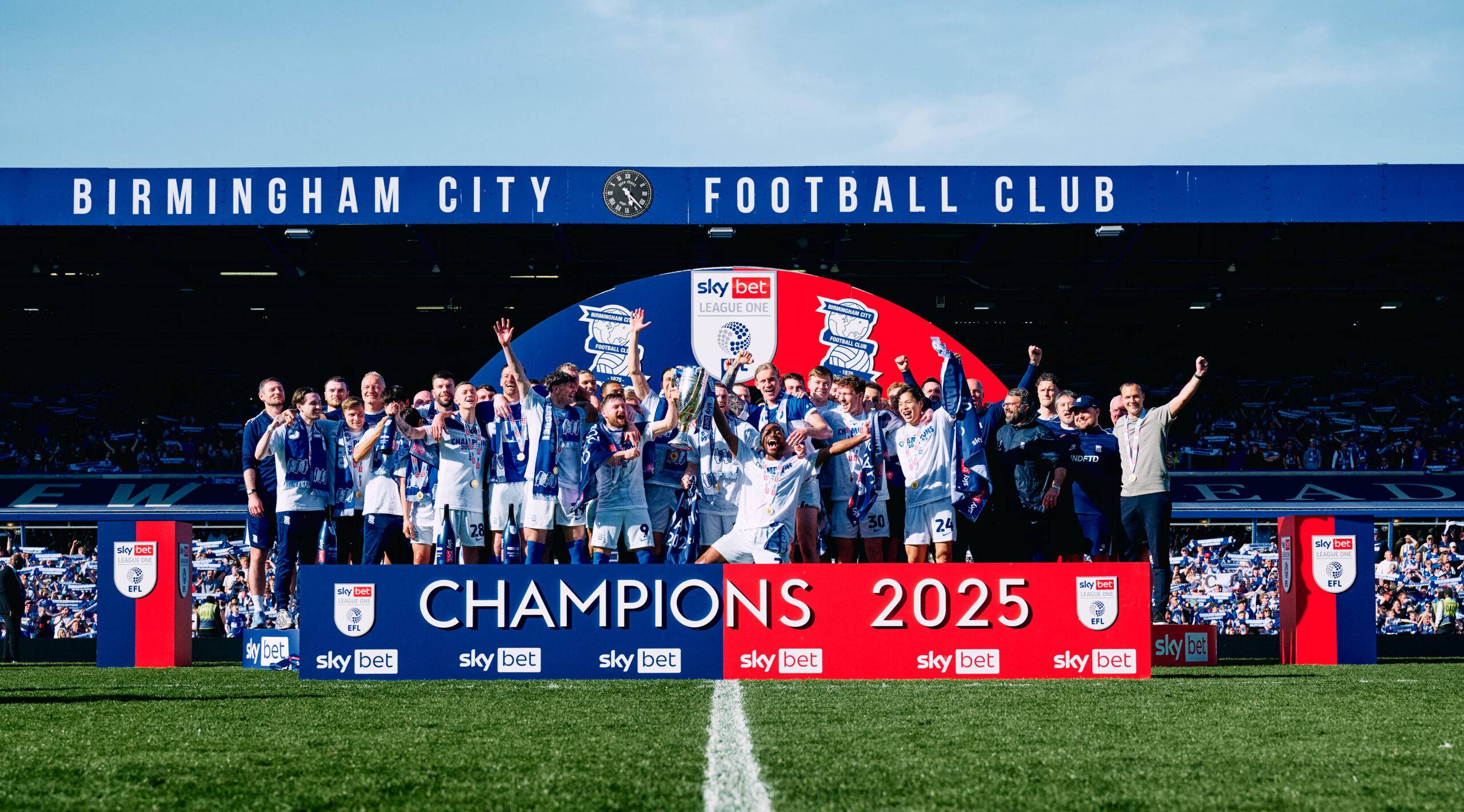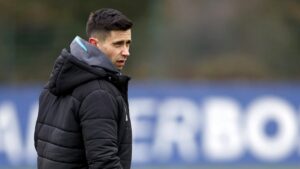We take a special look at a truly special season, one of the most remarkable in Blues’ history, through an in-depth appraisal. Sit back and enjoy . . .
A season for the ages.
Birmingham City’s class of 2024/25 became The Immortals, creating history and records galore.
Chris Davies’ side won promotion from League One at a canter, showing a metronomic, consistent control of their games and circumstances put before them.
I don’t think I’ve witnessed a team so dominant, clearly several levels above all others. It was like a cat toying with a mouse week in, week out.
Have there been sides more coruscating, thrill-a-minute and nail-biting? Maybe.
But let’s not be churlish here: what Blues achieved and how they did it, I doubt if we will see the like again.
They were also under enormous pressure, got everybody’s best effort and had to negotiate a gruelling 60-game schedule, having decided to fight at full strength on every possible front.
Control. That’s the word writ large in Davies’ philosophy.
He wanted his team to control possession and that in turn controls what the opposition can and can’t do. Keep the ball, recycle it, play to a positional pattern and structure and wear your enemy down.
‘Pounding the rock’, Davies called it midway through the season and that’s what it was. As virtually every team sat deep and tried to frustrate Blues in a hope-for-the-best strategy, they ended up finding out that resistance was, indeed, futile.
With such a lack of space most games, Blues had to pick their way through. There was little scope for dynamic, transition football as Blues were never truly put under the pump.
Blues had a ruthless, robotic efficiency about them. That was their elan. The pressing, the quality of interchanging movement, the defensive resilience, the ability to produce game-changing moments . . . it was just too, too good.
That several wins were by narrow margins showed a couple of things: opposition didn’t want to open up and come out to play for fear of sustaining a shellacking; and Blues had an assassin’s creed about them – sometimes that one decisive shot was all it took.
Often it allowed rival managers and fans to speculate that they had ‘done well’ or were ‘unfortunate’ against Blues who were, apparently according to plenty on social media ‘not all that’.
Comical, really.
There were games at home when, by half-time, Blues were clocking up upwards of 80 cent possession (the season average settled at just shy of 67 per cent – the highest in England’s top four divisions and only Barcelona, Bayern Munich and Paris St. Germain boasted better). Often sides left St. Andrew’s having had a solitary shot at goal, if few to no touches in the box.
As Blues came back off the last international break showing an unyielding relentlessness to clinch the title, they cut loose against Shrewsbury Town, Barnsley and Mansfield Town, showcasing some classy, beautifully incisive football.
The only disappointment came at Wembley, in front of more than 50,000 expectant Blues supporters, when a collective freeze and torpor enabled Peterborough United to seize the prize of the Vertu EFL Trophy.
Clinching promotion at Peterborough on the previous Tuesday and then learning the title was theirs on the bus down to Wembley . . . did it subconsciously take that edge off Blues? Davies has since said he believes so.
It would have been fitting had Blues won the double but that’s football; in a one-off anything can happen, and lessons will have been learned from that day.
Blues’ budget and spending power afforded them an advantage, of course.
A net outlay of £21 million. Unprecedented. But it’s not what you spend, it’s how you spend it.
Remember the cash that was splashed in the summer of 2017 under Harry Redknapp? Blues spent years recovering from it.
There was a strategy to recruitment led by Craig Gardner and Joe Carnall. It was no longer haphazard, or agent influenced. There were resources to upgrade processes and joined-up thinking. Data and certain metrics Blues look for – as well as character, which is crucial in changing a culture – now play a big part in deciding what the club action.
Potential new recruits were sold on the plans Blues have for the near to long term future, too. This is where we’re going – do you want in?
Jay Stansfield’s record-breaking addition was the culmination of a crusade by Tom Wagner, who wanted a marquee, sit-up-and-take-notice signing, to show bullishly that Blues meant business, even as a third tier outfit. They obliterated the club and divisional transfer record.

As important a recruit on that dramatic August deadline day was Tomoki Iwata, from Celtic, who went under the radar somewhat. As the fulcrum of the team, Iwata and Paik were perfect for Davies’ blueprint and nonpareil in the division.
And let’s not forget that appointing a 39-year-old to his first managerial job came straight out of left field. Wagner and Tom Brady took a risk, but they were sure they had found their man from the 1,000 they sifted through. And so, it proved.
Davies was not only under pressure to deliver promotion but change the playing style and oversee an upturn in culture and standards.
A meticulous coach and planner who demands everything is done right – witness how he on his players case constantly, foot-stomping and all, in his technical area – Davies transformed Blues identity remarkably quickly considering the summer turnover involving 30 plus players.
An underdog, low-block side of the past decade that often was confused by its own shadow having had so many managers, relegation near misses and continual craziness upstairs, was no more.
A modern, slick, progressive and possession-based team was fashioned. And it was a team that also out-worked all others. That was another non-negotiable for Davies. Look at the wingers, for example: Siriki Dembele didn’t last long, Ayumu Yokayama was direct and dashing but was loose going the other way and has since been sold. Keshi Anderson was a danger wide, contributing important goals and assists, and he also grafted and fulfilled his defensive duties – so he became a fixture.
We soon became used to the sight of right-back Ethan Laird saying high, wide and involved in so many goalmouth actions; the defence rolling into a back three, Christoph Klarer taking up residence midway into opposition half as teams were pinned in. The rotations and intricate football of the front players, picking their way through and around.
I remember sometime in October watching on at St. Andrew’s and being so relaxed, realising that for once here was a Blues team that wasn’t dysfunctional but giving off an air of calm superiority. There was no jeopardy; you always felt a Blues goal was coming and that they would win, sticking to their way.
Supporters were surprisingly patient, too, in the early days as the new style took hold. I guess it helps when you are winning regularly but there was a definite recognition that, after relegation, this was part of the hoped for reset and a new Blues was here to stay.
When Blues lost to bottom club Shrewsbury in November and looked awkward amid a chaotic second-half, Davies righted matters and defensively they became a lot more miserly and rugged. Ben Davies began to come to the fore too, and from then on, Blues never looked back.
Another tweak was to allow Ryan Allsop’s remarkable laser-guided long balls to bypass any opposition who did tried to press, as and when, to be incorporated into the Blues repertoire.
Davies wanted Blues to play a certain way, but he adopted pragmatism, too. When required, his side would go long and were prepared to dig in and fight fire with fire, showing strength and resilience. Defensively, they were warrior-like. And statistics showed that Blues were also the best at engaging from the front and stopping opponents build-up play in general.

There were so many candidates for the campaign’s best player, which is telling, even if the League One Team of the Season only found room for three of the Blues contingent.
Blues were the team of the season, and the best team seen at this level, and one of the best ever full stop if you go on statistics alone – 111 points? Ridiculous. A global professional league record, in fact.
A team in the true sense of the word, Blues would back one another up if there was a set-to. Even Allsop was out of the blocks like Usain Bolt to get to a melee at the other end of the pitch. We’ve not seen that kind of thing for a long, long time.
The campaign rolled along to a backdrop of (putting aside the Sports Quarter developments) smart executive decisions, revenue-builders and growing the wider interest by leveraging the Brady name and using provocative social media.
The surprise departure of CEO Garry Cook didn’t prove distracting as Jeremy Dale took up the mantle seamlessly.
Blues continued with the promised capital investment in the stadium, training ground, the Academy towards Category One status and the Women’s team was backed. The Foundation, from once being marginalised, remained of high importance.
The experience of going to St. Andrew’s was no longer a chore thanks to the fan parks, the upgrade in facilities and logistics, like secure car parking and free shuttle buses. People wanted to get there early to soak everything in, not reluctantly spill out of the Roost or the George at five-to-three.
Attendances were remarkable. The highest average since 2005/06, and this was for the third division. And we are now told there’s more than 12,000 people on a season ticket waiting list.
The atmosphere for the Newcastle United FA Cup tie was like the Blues of old in that first season as a Premier League club: loud, proud, ribald. It was a teaser for what could be to come, eventually.
The visit of Wrexham was a match when Blues welcomed the eyes of the world on them. Monday night football, live on Sky Sports. The Hollywood hype, David Beckham sitting next to Tom Brady in the directors’ box . . . it was a huge occasion. The way Blues recovered from going an early goal adrift, in that showcase atmosphere, proved a tangible, pivotal moment of what they, and the Wagner-led era, were about.
Seven months down the line, the sights and sounds of the afternoon of the Mansfield Town game will live long in the memory. It was a perfect storm of festival football in blazing hot sunshine, the trophy lift, plus a send-off to a modern legend in Lukas Jutkiewicz. Rarely do you get such celebratory days.
If Wagner is to be believed, as he intoned on the pitch after the Champions ceremony, there will be more, bigger and better, days to come: ‘It’s not even ******* close!’.
Let us hope he is right.
There’s time aplenty for dissecting what next in the Championship for Blues.
It would be remiss not to halt to smell the roses and reflect on what, by anyone’s standards, was a remarkable season just past. The Immortals.









